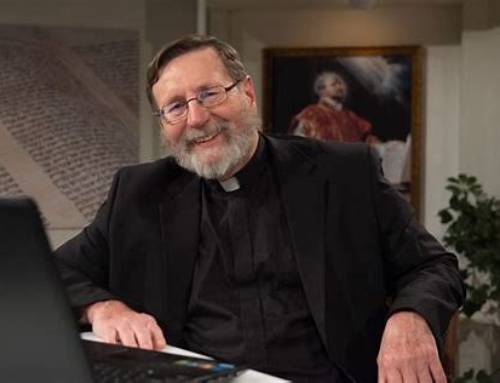Over at CRUX John Allen carries an interview between a Lutheran and a Catholic about ecumenism.
Kathryn Johnson is director of Ecumenical and Interreligious Relations for the Evangelical Lutheran Church in America while Sister Susan K. Wood is a member of the Sisters of Charity of Leavenworth, Kansas, a theology professor at Marquette and a veteran leader in Catholic/Lutheran dialogue.
It’s an interesting article because it reveals some of the genuine progress that has been made over the last fifty years in Protestants and Catholics understanding each other. It’s very big on enthusiasm about a “new Springtime” in ecumenism.
The attitudes expressed by the Lutheran ecumenist are pretty much shared by Anglicans, and for some time now Lutherans and Anglicans have recognized each others’ orders and there now exists a kind of Anglican-Lutheran federation within the world of mainstream Protestantism.
Johnson said,
I think Lutherans would want to say, very clearly, that the goal of the Protestant Reformation wasn’t separation, it was reform, and separation came later. It’s a side effect that we’ve lived with, and become overly comfortable with, for the last 500 years.
Wood observed
In the Catholic world before Vatican II, we had this notion of ‘return’ ecumenism, which really wasn’t ecumenism at all. It was, ‘Protestants are in error, and therefore they should come home to Rome.” This is what changed with the Second Vatican Council, in that we recognized elements of the Church of Christ in our separated brothers and sisters.
The two ecumenicists observed happily how the 1999 Joint Declaration on Justification was a huge step forward and how, at the grass roots level, there is increased understanding and co-operation between the Lutherans and Catholics.
Of course all of this is well and good and it is certainly better that Catholic and Lutheran Christians understand one another more and stop throwing stones at each other–or killing one another for that matter.
I don’t like to rain on anybody’s ecumenical parade, but ecumenical efforts are overly optimistic and starry eyed. It is the job of ecumenists to stress areas of unity, but to be realistic, the areas of unity between Catholicism and the Anglican-Lutheran mainstream are receding rapidly. While modest gains in the understanding of the doctrine of justification can be celebrated, on the other hand much wider rifts have opened up between the two churches which the optimistic ecumenists sweep under the carpet
When the Lutheran-Anglicans decided to ordain women as priests and bishops they put a bullet to the head of any real reconciliation with Catholicism. Before they took this step, the Pope along with the Easter Orthodox ecumenical patriarch wrote, pleading with them not to do so because of the serious damage to church unity. The same can be said for the Lutheran-Anglican embrace of the whole same sex agenda, the acceptance of remarriage after divorce, the endorsement of abortion and the list could go on and on.
It must be said that the Lutheran-Anglican federation took these unilateral steps. They knew they were deepening the divide in Christ’s Church and did so anyway.
This is not to pour salt into the wounds of division, but to be realistic.
Furthermore, when it comes to doctrine, not morals, the Anglican-Lutheran federation have not only pioneered the radically destructive Biblical criticism, but there have been Anglican-Lutheran bishops (not just theologians) who have denied the major tenets of the Christian faith in writing without so much as a comment or grimace of dismay from their Catholic ecumenical partners.
Is there a “new Springtime of ecumenism”? In one sense there really is. The unity between liberal Catholics and liberal Protestants has never been stronger. Liberal Catholics are virtually indistinguishable from mainstream Protestants. So called Progressive Catholics proclaim themselves to be pro-choice, in favor of same sex marriage, in favor of women’s ordination, in favor of admitting the divorced and remarried to communion.
Progressive Catholics, like Protestants, believe doctrine is “divisive”, like mainstream Protestants have deconstructed the Scriptures, doubted the basic tenets of the faith and marginalized and minimized the concepts of sin, redemption, the need for repentance and faith. Like mainstream Protestants the progressive Catholics are universalist–believing that everyone will go to heaven and that there is no hell.
Progressive Catholics, like their mainstream Protestant brothers and sisters have reduced Christianity to Moralistic, Therapeutic Deism, and it is not surprising that they feel an increased sense of unity with the mainstream Protestants. People like me have been saying that progressive Catholics are Protestants in Catholic clothes for a long time.
The division in the church therefore is not between Catholics and Protestants. Indeed progressive Catholics and mainstream Protestants agree on just about everything.
The true divide in the church today is between those who believe the Christian religion is a faith revealed by God for the salvation of souls and the redemption of the world by the atoning sacrifice of Jesus Christ, Son of God and Son of Mary and those who believe the Christian faith is a man made religion whose purpose is to make the world a better place….kind of like the Rotary Club but with prayers.
Catholics who believe the former actually have much in common with traditional Evangelical Protestants. We share the same views on Biblical morality, the need for repentance and salvation and the need to proclaim Christ’s gospel of God’s love and mercy.
This greater divide between what might be called historic Christianity and modernist Christianity is the elephant in the sanctuary. Instead of talks between progressive Catholics and mainstream Lutheran-Anglicans, perhaps there should be talks between the historic Christians and the modernists.
But I suspect such an enterprise would not get very far. As one Anglican bishop who believed the historic faith commented after the latest exasperating debate with a modernist in his church, “The conversation was like playing tennis on adjacent courts.”
Indeed. Because the underlying assumptions of historic Christianity and modernist Christianity are diametrically opposed.
For my own attempts at cordial ecumenical dialogue which has some real bite, check out my newly re-published book in which I debate the Marian dogmas with an Episcopalian layman. Our Lady? A Catholic-Evangelical Debate is the conversation I conducted with David Gustafson–an old classmate from Bob Jones University.





Leave A Comment
You must be logged in to post a comment.